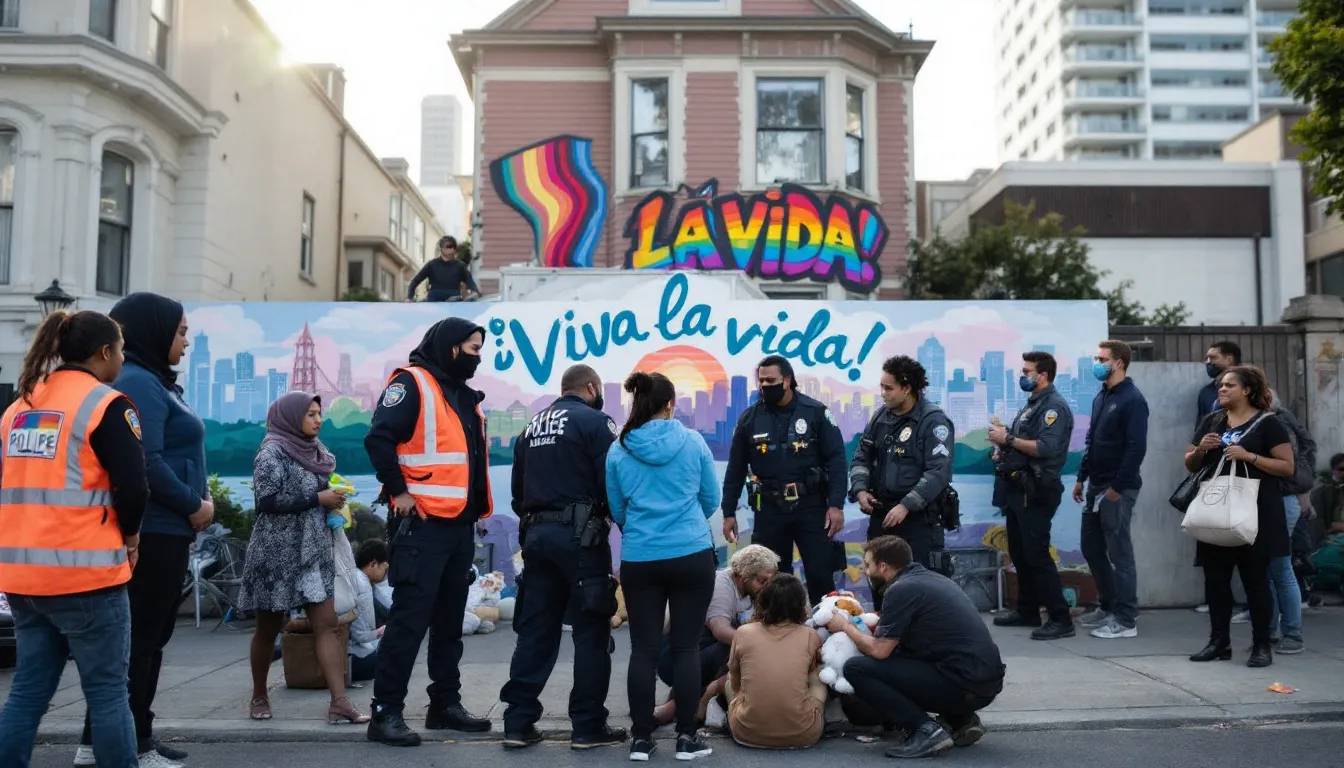Looking for San Francisco mental health services? This guide provides detailed information on the city’s range of support options. From crisis intervention and specialized treatments to affordable care through Medi-Cal, you’ll learn about the diverse services available and how to access them efficiently. Start here to understand your options and take the first step toward getting the help you need.
Key Takeaways
-
San Francisco provides a comprehensive range of mental health services, including over 400 options for behavioral health, crisis intervention, and emergency care.
-
The city emphasizes accessibility through programs like Medi-Cal and sliding scale fees, which help individuals with limited income obtain necessary mental health care.
-
Crisis intervention services, such as 24/7 hotlines and mobile response teams, offer immediate support for individuals experiencing mental health emergencies.
Comprehensive Mental Health Services in San Francisco

San Francisco boasts a diverse array of mental health services, accommodating various needs through both public and private healthcare options. The city’s commitment to providing coordinated and easily accessible mental health services ensures that residents can find the support they need. With over 400 mental health and substance use services available, San Francisco is dedicated to expanding behavioral health services, including crisis intervention and emergency care. Residents can access general information about the city’s mental health services through a dedicated information line, emphasizing its accessibility and availability.
From community-based programs to specialized treatment options, San Francisco’s mental health services are designed to meet the unique needs of its diverse population. This section explores the key components of these services, starting with the Behavioral Health Access Center, followed by community-based support programs and affordable options through Medi-Cal and sliding scale fees.
Behavioral Health Access Center
The Behavioral Health Access Center, located in SoMa, serves as a central point for connecting individuals to mental health and substance use services. Contacting Behavioral Health Services allows patients to initiate referrals and find affordable care through the Mental Health Referral Line, which provides general information about available mental health and substance use services, ensuring residents can easily access the support they need.
This central hub ensures that individuals can access the necessary support and resources to address their mental health needs.
Community-Based Support Programs
Community-based programs in San Francisco focus on providing individualized mental health support. These programs cater to the unique requirements of different populations, offering personalized care for various mental health concerns.
The impact of these programs is significant, enhancing mental health care accessibility and personalization throughout the community.
Medi-Cal and Sliding Scale Options
Medi-Cal, California’s Medicaid program, offers free or low-cost health coverage, including mental health services, for individuals with limited income. Eligibility, based on factors like income, family size, age, or disability status, broadens access to essential mental health services.
Additionally, sliding scale fees adjust the cost of services based on a person’s income and ability to pay, ensuring that financial constraints do not hinder access to mental health care. Together, these options enhance the overall accessibility of mental health support in San Francisco.
Specialized Behavioral Health Services
San Francisco offers a diverse range of specialized behavioral health services to cater to various mental health needs. With over 400 mental health and substance use services available, the city ensures that residents can find the appropriate care for their unique situations. The San Francisco VA Health Care System, for instance, provides comprehensive programs focused on addressing behavioral health issues, while organizations like NAMI SF offer helplines and resource guides to assist individuals with different mental health topics.
These specialized services are designed to address specific conditions and demographics, from substance use disorder treatment to couples therapy and family counseling, as well as services tailored for adults and seniors.
Substance Use Disorder Treatment
San Francisco offers a range of tailored behavioral health services for conditions such as substance use, trauma, and anxiety. Treatment options for substance use disorders include medication-assisted therapies and counseling services, providing a comprehensive approach to recovery.
The city also offers withdrawal management and residential recovery programs, integrating both therapeutic and medical elements to support individuals facing substance use challenges. These evidence-based programs facilitate recovery through therapy and support systems.
Couples Therapy and Family Counseling
Therapy services for couples and families in San Francisco are designed to address relationship dynamics affected by mental health issues. These services focus on enhancing communication and resolving conflicts, promoting better understanding and collaboration in addressing mental health challenges.
Whether it’s co-parenting counseling or support for relationship challenges, these therapeutic services aim to strengthen family dynamics and improve overall mental health.
Services for Adults and Seniors
San Francisco provides specialized behavioral health services tailored to the needs of both adults and seniors. These services address diverse conditions and demographics, ensuring that each population receives the appropriate care.
Senior mental health services address age-specific concerns such as dementia and late-life depression, providing comprehensive case management and therapeutic support.
Crisis Intervention and Emergency Services
San Francisco offers various crisis intervention services to provide immediate mental health support during emergencies. These services include a combination of immediate, short-term assistance for individuals experiencing mental health crises. The city’s 24-hour psychiatric emergency service can manage both voluntary and involuntary patients, ensuring that urgent care is always available. Additionally, a 24/7 access line at 888-246-3333 is available for individuals seeking mental health support.
The subsections explore the specific components of San Francisco’s crisis intervention and emergency services: immediate crisis response teams, residential care and treatment facilities, and 24/7 crisis hotlines.
Immediate Crisis Response Teams
The Street Crisis Response Team operates 24/7 across San Francisco to assist individuals experiencing mental health crises. This team provides on-site mental health support during emergencies, comprising trained professionals such as community paramedics, EMTs, and peer specialists who engage with clients.
The Mobile Crisis Treatment Team also offers immediate psychiatric crisis intervention services, ensuring comprehensive support for those in need.
Residential Care and Treatment Facilities
Intensive mental health care in San Francisco is available through various residential care and treatment facilities. These facilities provide comprehensive care for individuals requiring intensive mental health services, offering structured environments for treatment and rehabilitation.
The city is expanding its residential care capacity by 20%, adding around 400 treatment beds to existing facilities to meet the growing demand.
24/7 Crisis Hotlines
Crisis hotlines in San Francisco operate around the clock, offering urgent support for mental health emergencies. These hotlines, including the San Francisco Suicide Prevention hotline and the Psychiatric Emergency Services hotline, provide immediate emotional support and crisis intervention.
Available 24/7, these hotlines play a crucial role in ensuring that individuals in crisis always have access to the support they need.
Accessing Mental Health Services
Accessing mental health services in San Francisco involves understanding available resources, eligibility criteria, and application processes. The San Francisco Department of Public Health aims to enhance accessibility and coordination, providing resources like hotlines, community programs, and clinics to ensure support is within reach for everyone. Additionally, the San Francisco Department of Public Health provides general information through a dedicated information line, helping residents navigate the available mental health services.
The following subsections will guide you through the process of contacting a care coordinator, navigating referrals and evaluations, and utilizing telehealth services to access mental health care.
Contacting a Care Coordinator
Individuals can connect with a mental health care coordinator via the city’s access line, which provides personalized assistance. Coordinators help navigate the mental health system, offering tailored support based on personal needs.
This personalized approach ensures that individuals receive the appropriate guidance and resources to address their mental health concerns.
Navigating Referrals and Evaluations
Obtaining a referral for mental health services is a crucial first step in receiving appropriate care. This process often involves consultation with a primary care physician who can assess needs and provide guidance. Evaluations help determine the type and level of mental health care required, ensuring individuals receive the most effective treatment.
Utilizing Telehealth Services
Telehealth has become a crucial option for accessing mental health services, offering flexibility and convenience for appointments. In San Francisco, telehealth services allow patients to receive mental health therapy via video calls, ensuring accessibility across the region.
Programs like Medi-Cal offer financial assistance, making mental health services more affordable and accessible.
Confidentiality and Privacy in Mental Health Care
Maintaining confidentiality is critical for fostering trust and openness between clients and therapists. Patients have the right to expect their mental health information will be kept private and shared only with their consent. Mental health care providers are obligated to maintain the confidentiality of patient information, ensuring that patients feel secure in seeking help.
Understanding the confidentiality policies and the exceptions to these rules is essential for both patients and providers. This section covers the key aspects of confidentiality policies and the circumstances under which exceptions might apply.
Confidentiality Policies
Patients have the right to be informed about how care providers will use and share their mental health information. Confidentiality policies are designed to protect patient information, specifying that disclosures require explicit consent from the individual. This ensures that mental health services remain confidential and that patients can trust their providers to handle their information appropriately.
Exceptions and Consent
While confidentiality is a cornerstone of mental health care, there are a few exceptions under federal law. These exceptions typically involve situations where there is a risk of harm to the patient or others, requiring providers to disclose information without consent.
Understanding these exceptions helps navigate the complexities of confidentiality and consent in mental health services.
Additional Resources and Support
Additional resources and support systems play a crucial role in helping individuals navigate mental health challenges. Organizations like NAMI SF provide a helpline, guides, and a variety of resources addressing diverse mental health issues. Using these resources is essential for maintaining mental wellness and seeking necessary help.
This section explores the various resources available, from tailored support pages for specific demographics to local support groups, workshops, and online resources.
Resource Pages for Specific Demographics
NAMI SF offers a range of support groups and workshops tailored to different demographics and needs. Access to these tailored resources is vital for addressing the unique mental health needs of various populations.
These support resources play a crucial role in helping individuals navigate their mental health challenges.
Local Support Groups and Workshops
Local support groups and workshops in San Francisco provide invaluable peer support and educational opportunities for individuals facing mental health challenges. These groups foster a sense of community and shared experience among participants, covering topics like depression, anxiety, and trauma.
Educational workshops equip attendees with coping strategies and skills to manage their mental health effectively.
Online Resources and Helplines
Online resources and helplines offer additional support for individuals seeking mental health services. NAMI SF’s helpline, available at 415-237-0039, responds to messages typically within 12 hours, providing guidance and referrals.
The Resource Coordinator is available for live calls on Thursdays from 12:00 to 1:00 PM PT, ensuring that individuals can access support and information when needed.
Bay Area CBT Center Mental Health Services
At Bay Area CBT Center, mental health clinic in San Francisco, we offer comprehensive behavioral health services designed to help individuals overcome emotional distress, improve relationships, and build healthier coping strategies. Our approach integrates evidence-based therapy methods, including Cognitive Behavioral Therapy (CBT), Acceptance and Commitment Therapy (ACT), and Schema Therapy, ensuring that each client receives personalized treatment tailored to their unique needs.
Our team specializes in behavioral health interventions for a wide range of concerns, including anxiety, depression, trauma, relationship difficulties, and identity exploration. We focus on providing practical tools that empower clients to make meaningful changes in their lives. Whether through individual therapy, couples therapy, or group therapy, our goal is to offer actionable strategies that lead to real results.
Evidence-Based Treatment for Lasting Change
At Bay Area CBT Center, we emphasize behavior therapy as a cornerstone of our approach, helping clients identify and modify unhelpful patterns that contribute to emotional suffering. Our therapists use structured treatment plans to address issues such as avoidance, emotional dysregulation, and negative thought cycles.
We understand that accessing quality therapy is essential for long-term well-being, which is why we offer flexible options, including in-person and online therapy sessions. Whether you’re seeking support for stress management, trauma recovery, or improving emotional resilience, our behavioral health specialists are here to guide you through the process. With a strong commitment to providing science-backed treatment, Bay Area CBT Center is dedicated to helping clients achieve meaningful and sustainable mental health improvements.
Summary
Navigating the myriad of mental health services available in San Francisco can be daunting, but understanding the comprehensive care options, specialized treatments, and crisis interventions can make the journey more manageable. From the central role of the Behavioral Health Access Center to the tailored support offered through Medi-Cal and sliding scale fees, San Francisco therapists are committed to providing accessible and personalized mental health care. By leveraging community-based support programs, specialized services for substance use disorders, couples therapy, and age-specific care for adults and seniors, residents can find the support they need.
Crisis intervention services, including immediate response teams and 24/7 hotlines, ensure urgent care is always available. Accessing these services is facilitated by care coordinators, referrals, evaluations, and telehealth options, all while maintaining strict confidentiality and privacy. Utilizing additional resources and support systems, such as workshops and helplines, empowers individuals to maintain mental wellness and seek help when needed. Together, these elements create a robust mental health support system in San Francisco, fostering a healthier community.























































